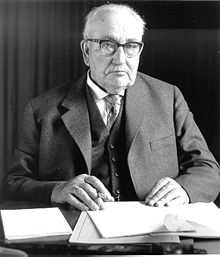Wilhelm Kaisen
| Wilhelm Kaisen | |
|---|---|
 |
|
| President of the Senate and Mayor of the Free Hanseatic City of Bremen | |
|
In office 1 August 1945 – 17 July 1965 |
|
| Deputy | Jules Eberhard Noltenius Adolf Ehlers Willy Dehnkamp |
| Preceded by | Erich Vagts |
| Succeeded by | Willy Dehnkamp |
| Personal details | |
| Born |
22 May 1887 Hamburg, German Empire |
| Died | 19 December 1979 (aged 92) Bremen, West Germany |
| Political party | Social Democratic Party |
| Spouse(s) | Helene Kaisen |
| Children | 4 |
Carl Wilhelm Kaisen (22 May 1887 – 19 December 1979) was a German politician from the Social Democratic Party of Germany (SPD). Between 1945 and 1965 he was the 2nd President of the Senate and Mayor of the Free Hanseatic City of Bremen. In 1958/59 he served as the 10th President of the Bundesrat. He became a symbol of the German reconstruction in Bremen after 1945.
Kaisen was born in the German city of Hamburg, and spent his youth there. His family's poverty did not allow him to visit a higher school or even receive a high school education. In 1905 he became a member of the SPD. After World War I, he moved to his wife's home city Bremen. Influenced by his family he managed to get the SPD into the parliament of Bremen (Bürgerschaft). From 1919 to 1928 he was journalist and editor-in-chief of the SPD newspaper Bremer Bürger-Zeitung. From 1920 to 1928 he was member of the Bürgerschaft. In 1928, Kaisen became the SPD Senator of Social Services in the Senate of Bremen. In March 1933, he was pressured to resign by Nazis.
Kaisen was not involved in politics during the Nazism era. He spent his time with agricultural work in the suburb of Bremen-Borgfeld.
On 1 August 1945, the US military government made Kaisen mayor of Bremen. Supported by the Liberals as well as the Communists he tried to re-establish the political and economical structures of the Weimar Republic. He was re-elected by the people of Bremen during the first free elections after the war. In July 1965, after nearly twenty years in office, he resigned as mayor.
Kaisen was very popular with the general public, but less so within the SPD itself. The decision to position Germany within the NATO led to a break with chairman of the SPD Kurt Schumacher.
...
Wikipedia
